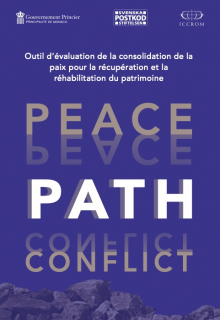With the aim of breaking language barriers and fostering peaceful societies, ICCROM is pleased to announce the release of the French version of PATH: Peacebuilding Assessment Tool for Heritage Recovery and Rehabilitation.
PATH has been created with the generous support of the Principality of Monaco, and field tested through Culture Cannot Wait, a capacity development project funded by the Swedish Postcode Foundation.
Every person has a right to access and enjoy cultural heritage. Nevertheless, cultural heritage is too often caught up in violent conflicts that are rooted in long-standing disputes over identity, resources and power.
The way we deal with heritage in the aftermath of a conflict can have powerful consequences in terms of social, political and economic capital. Thus, any intervention to safeguard heritage in such conflicts, if not carefully thought through, could have unintended outcomes and lead to further discord.
Click to enlarge
PATH is a first-of-its-kind reflective tool enabling users to identify vulnerabilities in their heritage recovery projects, which may inadvertently increase tensions and cause a backslide into conflict.
Written in a simple style and illustrated with diagrams and infographics, PATH is an easy read. The tool’s guiding questions and exercises are reinforced by rich foundational concepts to help users successfully plan, evaluate, and monitor their heritage projects in conflict settings.
In close collaboration with the Principality of Monaco and supported by the Swedish Postcode Foundation, PATH is conceived within the framework of ICCROM’s flagship programme First Aid and Resilience for Cultural Heritage in Times of Crisis. It is the first publication of the Toolkit on Heritage for Peace and Resilience, aimed at building and sharing knowledge on how safeguarding cultural heritage can contribute to fulfilling the targets of Sustainable Development Goal 16, which calls for ‘peaceful and inclusive societies for sustainable development’. Additionally, it helps users implement the Second Protocol to The Hague Convention of 1954 for the Protection of Cultural Property in the Event of Armed Conflict.
A version of PATH in Arabic will also soon be made available online.
ICCROM invites voluntary translations of all its key publications in the field of disaster risk management for cultural heritage.
For more information, contact us at: far_programme@iccrom.org


